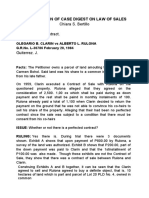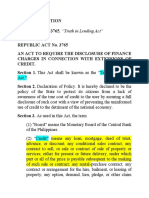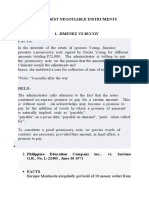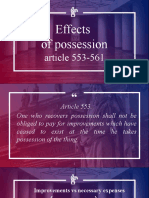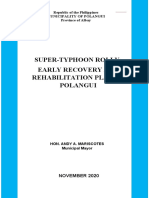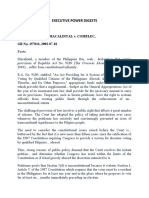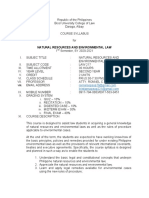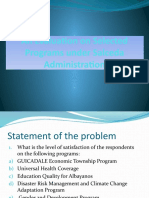0 ratings0% found this document useful (0 votes)
14 viewsCivrev Report On Guardianship and Emancipation
Civrev Report On Guardianship and Emancipation
Uploaded by
Stella BertilloCopyright:
© All Rights Reserved
Available Formats
Download as PDF or read online from Scribd
Civrev Report On Guardianship and Emancipation
Civrev Report On Guardianship and Emancipation
Uploaded by
Stella Bertillo0 ratings0% found this document useful (0 votes)
14 views95 pagesOriginal Title
CIVREV REPORT ON GUARDIANSHIP AND EMANCIPATION
Copyright
© © All Rights Reserved
Available Formats
PDF or read online from Scribd
Share this document
Did you find this document useful?
Is this content inappropriate?
Copyright:
© All Rights Reserved
Available Formats
Download as PDF or read online from Scribd
Download as pdf
0 ratings0% found this document useful (0 votes)
14 views95 pagesCivrev Report On Guardianship and Emancipation
Civrev Report On Guardianship and Emancipation
Uploaded by
Stella BertilloCopyright:
© All Rights Reserved
Available Formats
Download as PDF or read online from Scribd
Download as pdf
You are on page 1of 95
SALIENT PROVISIONS ON THE
RULES ON GUARDIANSHIP OF
MINORS
AM. NO. 03-02-05
APPLICABILITY OF
THE RULE
SECTION |
This Rule shall apply to petitions for guardianship over the
person or property, or both, of a minor.
The father and the mother shall jointly exercise legal
guardianship over the person and property of their
unemancipated common child without the necessity of a
court appointment. In such case, this Rule shall be suppletory
to the provisions of the Family Code on guardianship.
GUARDIANSHIP
DEFINED
* The power of protective authority given by law and
imposed on an individual who is free and in
the enjoyment of his rights, over one whose weakness
‘on account of his age or other infirmity renders him
unable to protect himself.
+A. trust relation which one person called
a“guardian” act for another called a “ward”, whom
the law regards as incapable of managing his or her
own affairs
) PURPOSE OF GUARDIANSHIP
A guardian is appointed to safeguard the
rights and interests of minors and
incompetent persons such that the
courts hould be vigilant to see that the
rights of such persons are properly
protected.
It is intended to preserve the ward's
property, as well as render the any assistance
that the ward may personally require.
,
.. er
&
CUSTODY VS, GUARDIANSHIP
Guardianship means a court grants
someone other than a biological parent
the right to care for a minor. Custody
(most often) generally describes a
parent caring for his or her own child.
WHO MAY PETITION BSR,
APPOINTMENT OF GUARDIAN
SECTION 2
On grounds authorized by law, any relative or other
person on behalf of a minor, or the minor himself if
fourteen years of age or over, may petition the Family
Court for the appointment of a general guardian over
the person or property, or both, of such minor. The
petition may also be filed by the Secretary of Social
Welfare and Development and by the Secretary of
Health in the case of an insane minor who needs to be,
hospitalized.
GUARDIAN
A person lawfully appointed to safeguard the
rights and interests of minors and
incompetent persons and charged with the
duty of taking care of a person who for some
peculiarity or status or defect of age,
understanding or self-control is
considered incapable of administering his
own affairs.
WARD
The person under guardianship
whom the law_ regards’ as
incapable of managing his own
affairs
KINDS
OF
GUARDIAN
ACCORDING TO SCOPE OF POWERS
GENERAL
GUARDIAN OF THE
PERSON GUARDIAN OF THE SUAROIAN
PROPERTY
ACCORDING TO THE CONSTITUTION
4
GUARDIAN AD JUDICIAL
LEGAL GUARDIAN LITEM GUARDIAN
WHERE TO FILE THE PETITION
A petition for guardianship over the
person or property, or both, of a 7
minor may be filed in the Family
Court of the province or city where ,
the minor actually resides. If he iG
ides i i ge ]
resides in a foreign country, the \\ =
petition shall be flied with the Family
Court of the province or city where
his property or any part thereof is
situated. (SECTION 3)
my,
CROUNDS OF WHE PEUTUION
(SECTION 4)
Death, continued absence, or
incapacity of his parents
Suspension, deprivation or
SCT ae Pec etd
rena ace nna
Pau CRE mC cd
CeCe LEE,
When the best interests of the
CLO nnCY CLL
QUANFIGATIONS OF A
(SECTION 5)
IN APPOINTING A GUARDIAN, THE COURT SHALL CONSIDER THE GUARDIAN'S:
SOOO
ae PUN TCA CI ENTAG FINANCIAL RELATION OF
CHARACTER AND PSYCHOLOGICAL
CONDITION; STATUS TRUST WITH THE
MINOR
LACK
INTERES:
ABILITY TO MANAGE THE
PROPERTY OF THE MINOR
OF CONFLICT OF
T WITH THE MINOR
WHO MAY BE APPOINTED GUARDIAN OF THE PERSON
OR PROPERTY, OB BOTH, OF A MINOR,
(SECTION 6)
IN DEFAULT OF PARENTS OR A COURT-APPOINTED GUARDIAN, THE
COURT MAY APPOINT A GUARDIAN OF THE PERSON OR PROPERTY, OR
BOTH, OF A MINOR, OBSERVING AS FAR AS PRACTICABLE, THE
FOLLOWING ORDER OF PREFERENCE:
(a) ene Sumit grandparent and In case
several te epee survive, the court
shall select any of them taking Into
account all relevant considerations:
G.R. No. 132223, June 19 2001
ISSUE:
WHO BETWEEN THE MOTHER AND
GRANDMOTHER OF MINOR VINCENT
SHOULD BE HIS GUARDIAN.
y, RULING OF
\) THE COURT
(b) the oldest brother or sister of the minor over
twenty-one years of age, unless unfit or
disqualified;
(c) the actual custodian of the minor over
twenty-one years of age, unless unfit or
disqualified;
(d) any other person, who in the sound discretion
of the court, would serve the best interests of the
minor.
CONTENTS OF THE PETITION
(SECTION 7)
INCOMPENTENT PERSON MINORS
4, Jurisdictional Facts: a) The jurisdictional facts:
Jurisdictional Facts to Be Alleged:
(b) The name, age and residence of the
RESIDENT INCOMPETENT prospective ward:
(c) The ground rendering the
ie see cf oe person for J appointment necessary or convenient:
whom guardianship is soug!
(d) The death of the parents of the minor
(b.) The ward is domiciled in the or the termination, deprivation or
Philippines suspension of their parental authority:
CONTENTS OF THE PETITION
INCOMPENTENT PERSON INORS
(2.) Incompetency rendering the (e) The remarriage of the minor's
appointment necessary or convenient, [| Surviving parent:
7 (f) The names, ages, and residences of
(3) Names, ages and residences of} relatives within the Uith civil degree of
Re ISRTERe o the minor, and of persons having him in
ee eet ane) their care and custody:
(4.) Probable value and character off (g) The probable value, character and
his estate location of the property of the minor:
and
CONTENTS OF THE PETITION
INCOMPENTENT PERSON MINORS
(5) Name of theperson for who (h) The name, age and residence of
letters of guardianship are the person for whom letters of
prayed guardianship are prayed.
OPPOSITION TO THE PETITION
(SECTION 10)
Any interested person may contest the petition
by filing a written opposition based on such
grounds as the majority of the minor or the
unsuitability of the person for whom letters
are prayed, and pray that the petition be
denied, or that letters of guardianship issue to
himself, or to any suitable person named in the
opposition.
QUE?
WHAT IF THE MINOR IS
A NON-RESIDENT?
>
AM 03-02-05 SECTION 12
TA
When the minor resides
outside the Philippines but has
property in the Philippines, any
relative or friend of such minor,
or any one interested in his
property, in expectancy or
otherwise, may petition the
Family Court for the
appointment of a guardian over
the property.
Notice of hearing of the petition shall be given to
the minor by publication or any other means as
the court may deem proper. The court may
dispense with the presence of the non-resident
minor.
If after hearing the court is satisfied that such
non-resident is a minor and a guardian is
necessary or convenient, it may appoint a
guardian over his property.
BOND OF GUARDIAN; AMOUNT; CONDITIONS
(SECTION 6)
BEFORE HE ENTERS UPON THE EXECUTION OF HIS TRUST, OR
LETTERS OF GUARDIANSHIP ISSUE, AN APPOINTED GUARDIAN MAY BE
REQUIRED TO POST A BOND IN SUCH SUM AS THE COURT SHALL
DETERMINE AND CONDITIONED AS FOLLOWS:
>» (a) To make and return to the court, within three
— months after the issuance of his letters of
— guardianship, a true and complete inventory of all
oe the property, real and personal, of his ward which
— shall come to his possession or knowledge or to
the possession or knowledge of any other person
oi in his behalf:
(b) To faithfully execute the duties of his trust, to
manage and dispose of the property according to this
rule for the best interests of the ward, and to provide
for his proper care, custody and education;
(c) To render a true and just account of all the
property of the ward in his hands, and of all proceeds
or interest derived therefrom, and of the management
and disposition of the same, at the time designated by
this rule and such other times as the court directs;
and at the expiration of his trust, to settle his
accounts with the court and deliver and pay over all
the property, effects, and monies remaining in his
hands, or due from him on such settlement, to the
person lawfully entitled thereto; and
(d) To perform all orders of the court and
such other duties as may be required by
law.
GENERAL DUVIES
OF A GUARDIAN
Section 17
A guardian shall have the care and custody of the person of his ward
and the management of his property, or only the management of his
property. The guardian of the property of a nonresident minor shall
have the management of all his property within the Philippines.
A guardian shall perform the following duties:
A
To ea y the just abi of
e ward out of the
personal property fant the
income of the real
property of the ward, If
the same is sufficient:
otherwise, out of the real
property of the ward upon
‘obtaining an order for its
sale or encumbrance;
B
To settle all accounts of his
ward, and demand, sue for,
receive all debts due him, or
may, with the approval of the
court, compound for the same
and give discharges to the
deb: n receiving a fair and
ay dividend of the property
and effects; and to appear for
and represent the ward in all
actions and special proceedings.
unless another person is
appointed for that purpose;
G
To manage the property of the
ward frugally and without waste,
and apply the income and profits
thereon, insofar as may be
necessary, to the comfortable
and suitable maintenance of the
ward; and if such income and
profits be insufficient for that
purpose, to sell or encumber the
real or personal property, upon
being authorized by the court
todo so;
® B B
Rgcosenute Jo submit to the court a (To report to the court
personal property owned verified inventory of the any properts cf io
joil il i war |0" jude
y the ward joinfly or in property of his ward te ee teca ec i"
commen) mith ot etsy ean three months! iMdiscovarsdkon
upon authority grante: after his appointment, ;
by the court after and annually thereafter, rece o eed te ote
pearing) notice boy the rendition of which Within three months
Gan Rearatca ee ward. may be required upon the after such discover
retul application of an ; i
investigation as to the merce succession, or
interested person; acquisition; and
necessity and propriet
of the iropoeedl tetion:
6
To render to the court
for its approval an
accounting of the
property one year from
his appointment, and
every year thereafter
or as of ten as may be
required.
GROUNDS FOR REMOVAL OR
RESIGNATION OF GUARDIAN
Section 24
When a guardian becomes insane or otherwise
Ol incapable of discharging his trust or is found
thereafter to be unsuitable,
When guardian has wasted or mismanaged
02 the property of the ward,
When a guardian has failed to render an account
or make a return for thirty days after it is due,
WHAT DOES THB GOURT BOY
The court may, upon
reasonable notice to
the guardian, remove
him as such and require
him to surrender the
property of the ward to
the person found to be
lawfully entitled
thereto.
The court may
allow the
guardian to
resign for
justifiable
causes.
Upon the removal
or resignation of
the guardian, the
court shall
appoint a new
one.
REMEMBER!
No motion for removal or resignation
shall be granted unless the guardian
has submitted the proper accounting
of the property of the ward and the
court has approved the same.
GROUND FOR TERCUINATION OF
GUARDIANSTIP
Section 25
The court motu proprio or upon verified motion of any person allowed to
file a petition for guardianship may terminate the guardianship.
Ah
ail
THE WARD HAS COME TO AGE OR HAS DIED
é
°
& ARTICLE 223 TY
Se a ae ea LCL OC cae
institution exercising parental authority, may petition the proper court of
RCM UML Met CO CU TOU TL Ce Tera EL
measures over the child. The child shall be entitled to the assistance of
counsel, either of his choice or appointed by the court, and a summary
Cee RU ra Le he eC Rey
Cert
CCU ete eT Oe CLs
ee an eC LCN he LLY
warrant, the court may also order the deprivation or suspension of parental
authority or adopt such other measures as it may deem just and proper.
& Ys a ee rr
ome ne Le tC
aC Oe OO ae eC CO CR Une tig
days in entities or institutions engaged in child care or in
CUM OR be tet Bie MT UCU
CCAM
The parent exercising parental authority shall not interfere
MTORR CUT Cte eee TT
PE CRC ee Cue ten eee a
Pecue eT CeCe eee)
CCRC Cus Sauce can
ta MT 32) ene
The parents have the right to demand respect
and obedience from their unemancipated children
~ 3
The law also grants parents the right and duty to
impose discipline upon their children as ied (2
Y required under the circumstances. ,
Ts Tat sy a at
aL (ornai Code | expressly
CO aba) ae
punishments. Although the Family
Code authorizes the imposition of
disciplinary measures to the
Cracks required under the
Ca CC AT) eet}
must not be interpreted as
CTY: POD hs) ATT.
Daye tT i
Art. 332. The courts may deprive the
parents of their authority or suspend the
exercise of the same if they should treat
their children with excessive harshness or
should give them corrupting orders, counsels,
or examples, or should make them beg or
abandon them. In these cases, the courts may
also deprive the parents in whole or in part, of
the usufruct over the child's property, or adopt
such measures as they may deem advisable in
the interest of the child.
R.A. 7610
Special Protection of Children
Against Abuse, Exploitation and
Discrimination Act
AN ACT PROVIDING FOR STRONGER DETERRENCE AND.
SPECIAL PROTECTION AGAINST CHILD ABUSE,
EXPLOITATION AND DISCRIMINATION, PROVIDING
PENALTIES FOR ITS VIOLATION AND FOR OTHER,
PURPOSES,
SOURCE: DEPARTMENT OF JUSTICE
The parent concerned may
also be held criminally liable
for violation of Republic Act
No. 7610, otherwise known
as the “Special Protection
of Children Against Abuse,
Exploitation and
Discrimination Act,” if he or
she employs excessive
harshness or cruelty upon
the child.
COMMITMENT TO CHILD CARE
ENTITIES
Pie en Ce Cee eC Cem CULT mr UL Cir a Cnr cry
PCO Cet eee See ar cee ert ct rs
URC Ae a a) Oe eu a Ce
entities or institutions engaged in child care or in children’ s homes duly
accredited by the proper government agency.
AW
\\
FAMILY COBE OVER
ADOPTED CHILD
RD
pe®
o Lae
If the adopted is a minor or otherwise incapacitated, the
adoption may be judicially rescinded upon petition of any
person authorized by the court or proper government
instrumental acting on his behalf, on the same grounds
prescribed for loss or suspension of parental authority. If
the adopted is at least eighteen years of age, he may
petition for judicial rescission of the adoption on the same
rs grounds prescribed for disinheriting an ascendant.
3} vow et
If the adopted is a minor or otherwise incapacitated, the
adoption may be judicially rescinded upon petition of any
person authorized by the court or proper government
instrumental acting on his behalf, on the same grounds
prescribed for loss or suspension of parental authority. If
the adopted is at least eighteen years of age, he may
petition for judicial rescission of the adoption on the
% same grounds prescribed for disinheriting an ascendant.
& &
GROUNDS FOR
SUSPENSION
OF PARENTAL
AUTHORITY
ART, 281 FAMILY EODE
Treats the child with
excessive harshness or
cruelty:
Gives the child
corrupting orders, 4
counsel or example .
Compels the child to beg
Subjects the child or
allows him to be
subjected to acts of
lasciviousness
ART. ane FAMILY CODE
If the person exercising
parental authority has
such person
shall be
by the court of such
authority.
Article 193, FC
CAUSES
FOR JUDICIAL
SEPARATION OF
ib PROPERTY
Art. 135, Family Code
Xx
ae
IF SEPARATION OF PROPERTY IS NOT PROVIDED FOR IN THE
MARRIAGE SETTLEMENTS, IT MAY BE RESORTED TO BY THE
SPOUSES DURING THE MARRIAGE IN TWO WAYS:
By filing a petition for legal separation:
By filing a petition for Separation of
property, either voluntarily or for
sufficient cause.
Art, 135, fami
o1
That the spouse of the
petitioner has been
sentenced to a penalty
which carries with it
civil interdiction;
i
02 \
That the spouse of the
petitioner has been
judicially declared an
—| absentee
That loss of parental
authority of the spouse
of petitioner has been
decreed by the court;
That the spouse of the petitioner has
abandoned the latter or failed to
comply with his or her obligations to
the family as provided for in Article
101.
That the spouse granted the
04 power of administration in the
marriage settlements has
abused that power
That at the time of the petition,
the spouses have been
O55 separated in fact for at least one
year and reconciliation is highly
improbable
The presentation of the |
| final judgment convicting
~ the accused of a crime |
which carries with it civil
_ interdiction Shall be enough _
bpsis for the arant of the
decree o oF rope
GePpEaior. of property.
-
aay ga SUT BRLESaGa pAUea aN © pala" « eoeasaae.
| Civil Interdiction
An accessory penalty which deprives shall
the offender during the time of his
sentence the following: (Art. 34 RPC)
T
{
(1) right to dispose of his property by an
act inter vivos;
(2) marital rights,
(3) parental authority;
(4) guardianship of any ward; an
(5) management of his property
T
+t —"“T
SS
The, presentation of the. am
__ final judgment convicting
the accused of a crime
which carries with it civil
_ interdiction Shall be enough |
Basie for the Henan of the
decree of judicial:
separation of property.
fo
Pet
| He
Judicial Declaration —
of Absence ++
Two years having elapsed without any
news about the absentee or since the
receipt of the last news, and five years
in case the absentee has left a person
in charge of the administration of his
property, his absence may be
declared (Art. 384 NCC)
I dnl: + j—_}—}-_|_}_ _}_}_}. 4 }—+
PITT ere BE
| Judicial Declaration of
i Absence T
Under Article 231 of the Family Code,
the court may deprive the guilty party of
|| parental authority based on the grounds _|
mentioned therein “if the degree of
seriousness so warrants or the welfare of
the child so demands” in an action filed
| |
The! presentation of the| 7 for the purpose or in a related case.
final judgment convicting L =
—>~theaccusedofiacrime. > Ifthe person exercising parental
which carries with it civil authority has subjected the child or
allowed him to be subjected to sexual
- Mosk tartbeSranterthe —- abuse, such person shall also be
permanently deprived by the court of
decree of judicial: such authority.
+ ee PrORBE HY: oe
e f
{+} +} —} —_} 4__}__}__} -
PP 4 BE —
| | _ Abandonment or Failure |
to Comply with T
Obligations to rhe +
| | | {| | | Family |
za
|__| The obligations referred to are
| | those embraced by Articles 68
| | | up to 71 of the Family Code as
regards the husband and wife
| ] as well as Articles 220, 221 and
' To +— +} 225 of the same Code in regard
i t to parents and their children.
CLO
ARTICLE 68
The husband and wife are obliged to
live together, observe mutual love,
respect and fidelity, and render
mutual help and support.
ARTICLE 69
The husband and wife shall fix
the family domicile
ARTICLE 70
The spouses are jointly |-—
responsible for the support [+
of the family
ARTICLE 71
The management of the \
household shall be the right and |_|
the duty of both spouses.
The parents and those exercising parental authority shall have with the respect to their unemancipated children on wards the
following rights and duties
(1) To keep them in their company, to support, educate and instruct them by right precept and good example, and to provide for
their upbringing in keeping with their means;
(2) To give them love and affection, advice and counsel, companionship and understanding;
(3) To provide them with moral and spiritual guidance, inculcate in them honesty, integrity, self-discipline, self-reliance, industry
and thrift, stimulate their interest in civic affairs, and inspire in them compliance with the duties of citizenship;
(4) To furnish them with good and wholesome educational materials, supervise their activities, recreation and association with
others, protect them from bad company, and prevent them from acquiring habits detrimental to their health, studies and morals;
(6) To represent them in all matters affecting ther interests;
(6) To demand fram them respect and obedience;
(1) To impose discipline on them as may be required under the circumstances; and
(8) To perform such other duties as are imposed by law upon parents and guardians.
Abuse of Power of
Administration 7
it is necessary that the power of
administration must be granted to the
abusive spouse in the marriage
settlement itself, otherwise the provi- ——
sions of paragraph 5 of Article 135 will
not apply.
If the power of administration has been
assumed solely by one of the spouses in
view of the incapacity or inability of the
other spouse to participate in the
administration of the —_ absolute
community or the conjugal partnership
of gains, and not by virtue of the
marriage settlements, any abuse of such
power is not the ground contemplated
in Article 135(5).
Be —
Separation in Fact
A mere separation in fact
between the spouses does not
bring about a _ regime of
separation of property. However,
when the spouses have been
separated in fact for at least one
year and recon- ciliation is
highly improbable, either of the
spouse may petition for sepa-
ration of property.
{
Revival of
the Prop ertya
Regime < of t
pouses
Art. 141, Family Code
o
When the civil interdiction
terminates
When the absentee
Spouse reappears
When the court, being satisfied that
the spouse granted the power of
administration in the marriage
settlements will not again abuse that
power, authorizes the resumption of
said administration;
When the spouse who has left the
conjugal home without a decree of
legal separation resumes common
life with the other
When parental authority is judicially
restored to the spouse previously
deprived thereof
When the spouses who have
separated in fact for at least one
year, reconcile and resume common
life; or
When after voluntary
dissolution of the absolute
community of property or
conjugal partnership has been
judicially decreed upon the
oint petition of the spouses,
hey agree to the revival o
the former property regime,
No voluntary separation of
property may thereafter be
grante
_ EMANCIPATION
AGE OF MAJORITY R
A ——
QGaadiadddcadeodou
Pn. 4
Emancipation takes place by the
Unless otherwise
| provided, majority commences at the age
of eighteen years
A eenaneipation takes place:
‘
an tS q o
: Ww - ga ae
4 ™ py the recording in the Civil Register of an
a agreement in a public instrument executed
ra the parent exerssing parental autherity
en 5 f ‘and the minor at least eighteen years of
= By the marriage of the minor age Such emancipation shall be
: irrevocable,
EMANCIPATION
———
Freeing of the child from the parental
authority and custody of, and from the
obligation to render services to, the
parentl and thereby rendering the child
qualified and responsible for all acts of
civil life
EFFECTS OF EMMANCIPATION
fYoueta et D
Youutull
paYasets tt}
1 3
2 r
Termination of fe Child now acquires
parental child is qualified and fall evil opacity and
authority over responsible for all may now enter into
the person and ate of eit fey save contracts without the
property of the fre excep clon) assistance of his
child | established by existing
, arents or guardians.
[ laws in special cases. { i a
Derestee
HOWEVER
ope ane®
d obligations
e parents even
ine’ Y
eG arentol
~~
When a.child, already
emancipated but
below 21, contracts
|) marriage, Article 14
of the Family Code
i still requires
parental consent.
2
When a child,
above 21 but below
25, contracts
marriage, Article
15 of the Family
Code still requires
parental advice.
3
When a child, already
emancipated but below 21,
intends to execute a
marriage settlement with
his or her future spouse
prior to the celebration of
the marriage, the law
requires that the person
whose con- sent is required
under article 14 of the Cod
must be made a party
“thereto ~
os ;
The obligation of the
parents to support
their children is not
j co-terminus with
the exercise of
| parental authority
: r
5
While the child is
already emancipated
and no longer under the
parental authority of
his parents, the parents
are still liable for the
quasi- delict committed
by said child if the
latter is below 21
-
—Y apticue 235 Fe
7
The provisions governing emancipation by
recorded agreement shall also apply to an
orphan minor and the person exercising
parental authority but the agreement must be
approved by the court before it is recorded
-
.
—Y pavicue 237 F¢
The annulment or declaration of nullity of the
marriage of a minor or of the recorded agreement
mentioned in the foregoing. Articles 234 and 235
shall revive the parental authority over the minor
but shall not affect acts and transactions that took
place prior to the recording of the final judgment in
the Civil Register
BERTILLO
THANK
YOU
You might also like
- The Subtle Art of Not Giving a F*ck: A Counterintuitive Approach to Living a Good LifeFrom EverandThe Subtle Art of Not Giving a F*ck: A Counterintuitive Approach to Living a Good LifeRating: 4 out of 5 stars4/5 (6026)
- The Gifts of Imperfection: Let Go of Who You Think You're Supposed to Be and Embrace Who You AreFrom EverandThe Gifts of Imperfection: Let Go of Who You Think You're Supposed to Be and Embrace Who You AreRating: 4 out of 5 stars4/5 (1134)
- Never Split the Difference: Negotiating As If Your Life Depended On ItFrom EverandNever Split the Difference: Negotiating As If Your Life Depended On ItRating: 4.5 out of 5 stars4.5/5 (911)
- Grit: The Power of Passion and PerseveranceFrom EverandGrit: The Power of Passion and PerseveranceRating: 4 out of 5 stars4/5 (628)
- Hidden Figures: The American Dream and the Untold Story of the Black Women Mathematicians Who Helped Win the Space RaceFrom EverandHidden Figures: The American Dream and the Untold Story of the Black Women Mathematicians Who Helped Win the Space RaceRating: 4 out of 5 stars4/5 (945)
- Shoe Dog: A Memoir by the Creator of NikeFrom EverandShoe Dog: A Memoir by the Creator of NikeRating: 4.5 out of 5 stars4.5/5 (548)
- The Hard Thing About Hard Things: Building a Business When There Are No Easy AnswersFrom EverandThe Hard Thing About Hard Things: Building a Business When There Are No Easy AnswersRating: 4.5 out of 5 stars4.5/5 (359)
- Her Body and Other Parties: StoriesFrom EverandHer Body and Other Parties: StoriesRating: 4 out of 5 stars4/5 (831)
- Elon Musk: Tesla, SpaceX, and the Quest for a Fantastic FutureFrom EverandElon Musk: Tesla, SpaceX, and the Quest for a Fantastic FutureRating: 4.5 out of 5 stars4.5/5 (481)
- The Emperor of All Maladies: A Biography of CancerFrom EverandThe Emperor of All Maladies: A Biography of CancerRating: 4.5 out of 5 stars4.5/5 (275)
- The Yellow House: A Memoir (2019 National Book Award Winner)From EverandThe Yellow House: A Memoir (2019 National Book Award Winner)Rating: 4 out of 5 stars4/5 (99)
- The Little Book of Hygge: Danish Secrets to Happy LivingFrom EverandThe Little Book of Hygge: Danish Secrets to Happy LivingRating: 3.5 out of 5 stars3.5/5 (434)
- Devil in the Grove: Thurgood Marshall, the Groveland Boys, and the Dawn of a New AmericaFrom EverandDevil in the Grove: Thurgood Marshall, the Groveland Boys, and the Dawn of a New AmericaRating: 4.5 out of 5 stars4.5/5 (273)
- The World Is Flat 3.0: A Brief History of the Twenty-first CenturyFrom EverandThe World Is Flat 3.0: A Brief History of the Twenty-first CenturyRating: 3.5 out of 5 stars3.5/5 (2283)
- The Sympathizer: A Novel (Pulitzer Prize for Fiction)From EverandThe Sympathizer: A Novel (Pulitzer Prize for Fiction)Rating: 4.5 out of 5 stars4.5/5 (125)
- Team of Rivals: The Political Genius of Abraham LincolnFrom EverandTeam of Rivals: The Political Genius of Abraham LincolnRating: 4.5 out of 5 stars4.5/5 (235)
- A Heartbreaking Work Of Staggering Genius: A Memoir Based on a True StoryFrom EverandA Heartbreaking Work Of Staggering Genius: A Memoir Based on a True StoryRating: 3.5 out of 5 stars3.5/5 (233)
- On Fire: The (Burning) Case for a Green New DealFrom EverandOn Fire: The (Burning) Case for a Green New DealRating: 4 out of 5 stars4/5 (75)
- Compilation of Case Digest On Law of SalesDocument107 pagesCompilation of Case Digest On Law of SalesStella BertilloNo ratings yet
- The Unwinding: An Inner History of the New AmericaFrom EverandThe Unwinding: An Inner History of the New AmericaRating: 4 out of 5 stars4/5 (45)
- Presentation On Ra 11930Document40 pagesPresentation On Ra 11930Stella Bertillo100% (3)
- Report On RemrevDocument42 pagesReport On RemrevStella BertilloNo ratings yet
- Case Assignment CivproDocument23 pagesCase Assignment CivproStella BertilloNo ratings yet
- Case DIgest CreditsDocument72 pagesCase DIgest CreditsStella BertilloNo ratings yet
- Bertillo - Phil. Guaranty Co. Inc. Vs CIR and CTADocument2 pagesBertillo - Phil. Guaranty Co. Inc. Vs CIR and CTAStella BertilloNo ratings yet
- Letter For The Lawaan RoomsDocument1 pageLetter For The Lawaan RoomsStella BertilloNo ratings yet
- Case Digest Negotiable InstrumentsDocument18 pagesCase Digest Negotiable InstrumentsStella Bertillo0% (1)
- Civ Pro Full Text Week 7Document36 pagesCiv Pro Full Text Week 7Stella BertilloNo ratings yet
- Political Science Club: Atty. Alex B. Nepomuceno, Ph. DDocument2 pagesPolitical Science Club: Atty. Alex B. Nepomuceno, Ph. DStella BertilloNo ratings yet
- WEEK 4 To 10 TAXDocument27 pagesWEEK 4 To 10 TAXStella BertilloNo ratings yet
- W4 V 07 RoxasvsRafferty BertilloDocument2 pagesW4 V 07 RoxasvsRafferty BertilloStella BertilloNo ratings yet
- Counter Claim On The Matter of Jurisdiction of The Philippines in The West Philippine SeaDocument9 pagesCounter Claim On The Matter of Jurisdiction of The Philippines in The West Philippine SeaStella BertilloNo ratings yet
- Polsay Days ProposalDocument3 pagesPolsay Days ProposalStella BertilloNo ratings yet
- Debate Competition: General Rules and Regulations/Guidelines For The DEBATE COMPETITIONDocument2 pagesDebate Competition: General Rules and Regulations/Guidelines For The DEBATE COMPETITIONStella BertilloNo ratings yet
- Bertillo - Phil. Guaranty Co. Inc. Vs CIR and CTADocument2 pagesBertillo - Phil. Guaranty Co. Inc. Vs CIR and CTAStella BertilloNo ratings yet
- COURSE OUTLINE IN Republic Act 7942Document3 pagesCOURSE OUTLINE IN Republic Act 7942Stella BertilloNo ratings yet
- BR For Dance CompetitionDocument1 pageBR For Dance CompetitionStella BertilloNo ratings yet
- Bertillo, Chiara Marie Ruffastella - Possession PDFDocument45 pagesBertillo, Chiara Marie Ruffastella - Possession PDFStella BertilloNo ratings yet
- Rehab Plan - Typhoon RollyDocument67 pagesRehab Plan - Typhoon RollyStella Bertillo100% (1)
- Executive Power Digests: Atty. Romulo B. Macalintal V. Comelec, GR No. 157013, 2003-07-10Document53 pagesExecutive Power Digests: Atty. Romulo B. Macalintal V. Comelec, GR No. 157013, 2003-07-10Stella BertilloNo ratings yet
- Course Syllabus On NrelDocument17 pagesCourse Syllabus On NrelStella BertilloNo ratings yet
- D. T. Reyes, Liaison and Associates For Petitioner-Appellant. Office of The Solicitor General For Plaintiff-AppelleeDocument54 pagesD. T. Reyes, Liaison and Associates For Petitioner-Appellant. Office of The Solicitor General For Plaintiff-AppelleeStella BertilloNo ratings yet
- A Policy Analysis On The Philippine Plan of Action For Nutrition (2011-2016)Document12 pagesA Policy Analysis On The Philippine Plan of Action For Nutrition (2011-2016)Stella BertilloNo ratings yet
- For DefenseDocument6 pagesFor DefenseStella BertilloNo ratings yet




































